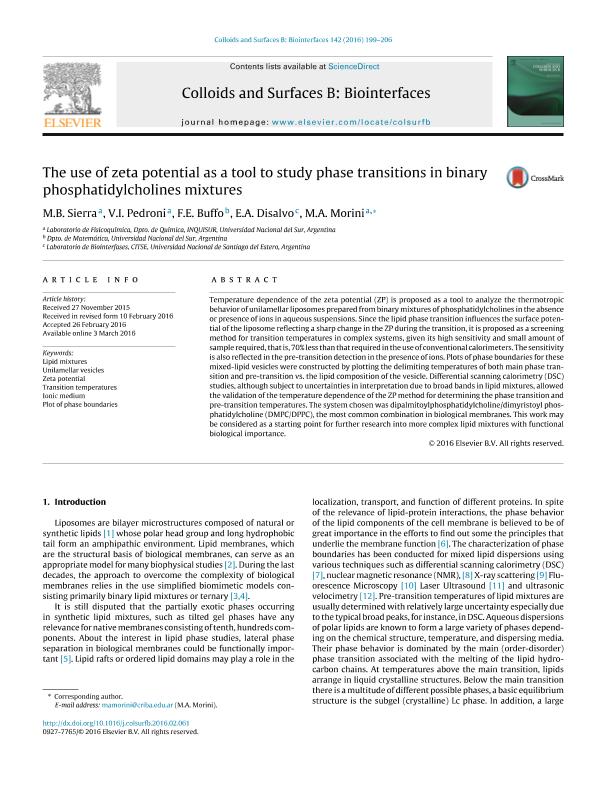Artículo
The use of zeta potential as a tool to study phase transitions in binary phosphatidylcholines mixtures
Sierra, Maria Belen ; Pedroni, Viviana Isabel; Buffo, Flavia Edith; Disalvo, Edgardo Anibal
; Pedroni, Viviana Isabel; Buffo, Flavia Edith; Disalvo, Edgardo Anibal ; Morini, Marcela Ana
; Morini, Marcela Ana
 ; Pedroni, Viviana Isabel; Buffo, Flavia Edith; Disalvo, Edgardo Anibal
; Pedroni, Viviana Isabel; Buffo, Flavia Edith; Disalvo, Edgardo Anibal ; Morini, Marcela Ana
; Morini, Marcela Ana
Fecha de publicación:
06/2016
Editorial:
Elsevier Science
Revista:
Colloids and Surfaces B: Biointerfaces
ISSN:
0927-7765
Idioma:
Inglés
Tipo de recurso:
Artículo publicado
Clasificación temática:
Resumen
Temperature dependence of the zeta potential (ZP) is proposed as a tool to analyze the thermotropic behavior of unilamellar liposomes prepared from binary mixtures of phosphatidylcholines in the absence or presence of ions in aqueous suspensions. Since the lipid phase transition influences the surface potential of the liposome reflecting a sharp change in the ZP during the transition, it is proposed as a screening method for transition temperatures in complex systems, given its high sensitivity and small amount of sample required, that is, 70% less than that required in the use of conventional calorimeters. The sensitivity is also reflected in the pre-transition detection in the presence of ions. Plots of phase boundaries for these mixed-lipid vesicles were constructed by plotting the delimiting temperatures of both main phase transition and pre-transition vs. the lipid composition of the vesicle. Differential scanning calorimetry (DSC) studies, although subject to uncertainties in interpretation due to broad bands in lipid mixtures, allowed the validation of the temperature dependence of the ZP method for determining the phase transition and pre-transition temperatures. The system chosen was dipalmitoylphosphatidylcholine/dimyristoyl phosphatidylcholine (DMPC/DPPC), the most common combination in biological membranes. This work may be considered as a starting point for further research into more complex lipid mixtures with functional biological importance.
Archivos asociados
Licencia
Identificadores
Colecciones
Articulos(INQUISUR)
Articulos de INST.DE QUIMICA DEL SUR
Articulos de INST.DE QUIMICA DEL SUR
Articulos(SEDE CENTRAL)
Articulos de SEDE CENTRAL
Articulos de SEDE CENTRAL
Citación
Sierra, Maria Belen; Pedroni, Viviana Isabel; Buffo, Flavia Edith; Disalvo, Edgardo Anibal; Morini, Marcela Ana; The use of zeta potential as a tool to study phase transitions in binary phosphatidylcholines mixtures; Elsevier Science; Colloids and Surfaces B: Biointerfaces; 142; 6-2016; 199-206
Compartir
Altmétricas



